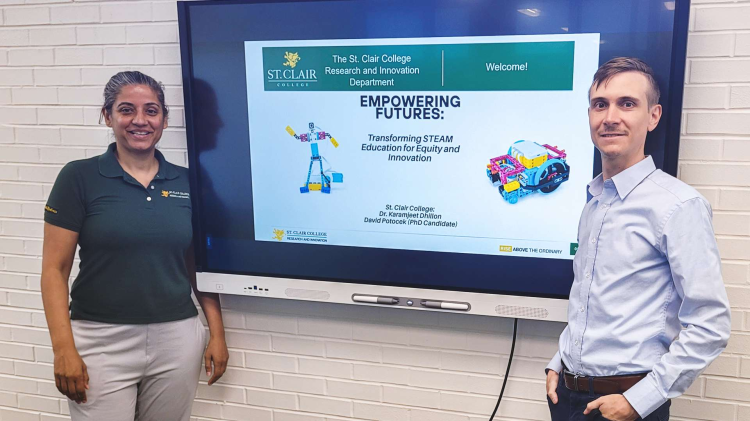St. Clair College is ushering in a new era one where research begins with the student, extends through faculty mentorship, and reaches into the heart of community transformation. At its core is a commitment to grassroots inquiry: research that is accessible, collaborative, and deeply connected to the needs and strengths of the communities the College serves.

Driving Equity in STEAM: David Potocek and Dr. Karamjeet Dhillon of St. Clair College Showcase OVIN Success at CSSE 2025 at George Brown College, Toronto on June 1, 2025. (Dr. Karamjeet Dhillon/St. Clair College)
This vision was made tangible at the 2025 Congress of the Humanities and Social Sciences Canada's largest interdisciplinary academic gathering hosted this year at George Brown College in Toronto. Multiple student-led and student-informed projects were featured across national platforms, including the Canadian Society for the Study of Education (CSSE) and the Canadian Sociological Association (CSA). A clear narrative emerged: when students are engaged as knowledge creators, the outcomes are innovative, inclusive, and impactful.
Dr. Karamjeet K. Dhillon and David Potocek presented the evolution of the Ontario Vehicle Innovation Network (OVIN) initiative highlighting how more than 1,000 youth have been reached through robotics, coding, and XR-enhanced learning experiences.
Student researchers not only contributed to curriculum design but also led facilitation, offering near-peer mentorship that reflects both technical skill and community empathy. Their involvement didn't just support the program it shaped it, reinforcing the idea that applied research is most effective when driven from the ground up.
At the CSA conference, student voices were again at the forefront.
Sarah Wilkins and Madison Dekok, graduates of the Honours Bachelor of Applied Arts in Social Justice and Legal Studies (BASJ) program, presented on topics of youth homelessness and gender-based violence.
Under the guidance of Drs. Kyle Jackson and Amy Peirone, their research combined academic rigour with lived experience, community collaboration, and a commitment to justice. Their work, supported by partnerships with local agencies and funded through national grants, underscored how student-led inquiry can actively shape policy, service provision, and public awareness.
"Research is not a separate pillar it's the connective tissue of a college that listens, learns, and leads," says Dr. Karamjeet K. Dhillon, Director of Research and Innovation. "At St. Clair, we see research as both a receiver and giver of knowledge deeply rooted in community, driven by students, and guided by purpose."
Weaved through each of these stories is a consistent theme: research at St. Clair College is not siloed it is woven through learning environments, embedded in curriculum, and carried forward by students whose curiosity meets real-world complexity. It is a relational process, where students do not only absorb knowledge they contribute to it, shape it, and mobilize it.
As the College looks ahead to the next 12 months, the focus is on amplifying this model. Regional research showcases, national and international presentations, and digital storytelling platforms will celebrate these milestones.
But sustaining this momentum also requires intention: grant funds that are timely, accessible, and grounded in equity. These resources allow research to remain student-driven and community-rooted responsive not just to institutional goals, but to the everyday realities that research seeks to understand and transform.
Through this evolving approach, St. Clair College is not only building capacity it is building trust. Research becomes a bridge, connecting the campus to the community and students to systems they are ready to challenge and improve. This is research not as theory, but as action. Not as a finished product, but as a shared process.
And in this shared process, students are no longer preparing for the future they are helping to create it.












